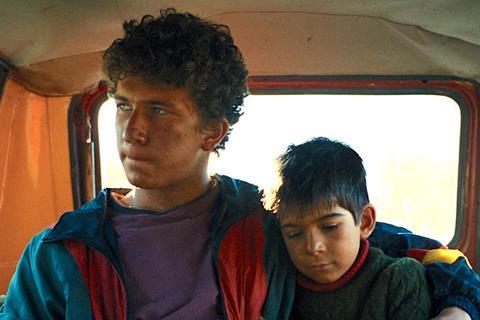A teenage boy uses music as an escape from everyday life in his rural North Macedonian village

Dir/scr: Georgi M Unkovski. North Macedonia/Czech Republic/Serbia, Croatia. 2025. 99mins.
“Music is the medicine for everyone,” a man declares part way into this coming of age charmer, encapsulating one of the essential themes of this story about a teenage boy whose big ambitions are at odds with the reality of life in a rural North Macedonian village. Filmmaker Georgi M Unkovski employs music in various forms in his feature debut, approaching its clash between youthful rebellion and traditional culture with a non-judgmental warmth and an open heart.
Coming of age charmer
DJ Ahmet premieres in the World Cinema Dramatic Competition at Sundance, where Unkovski’s short Sticker played in 2019. While his feature script is a little loose in places, its crowd-pleasing sweetness should see the film make a name for itself beyond the festival.
Music is a form of escape for 15-year-old Ahmet (Arif Jakup) and his younger brother Naim (Agush Agushev), who radiate joy as they dance together whenever they get the chance. The pair live with their gruff and grieving father (Aksel Mehmet) and, following his mother’s death, Ahmet has had to quit school to help his dad with the sheep. Naim has stopped speaking, leading their father to regularly cart him off to the local healer.
Early scenes between the boys smoothly establish their relationship, which comes across as a closeness with no need for conversation. The tousle-headed Jakup brings a winning shyness to Ahmet, who is nevertheless fiercely protective of his brother, although it’s Agushev who proves to be a pint-sized scene stealer at almost every turn.
Music is what takes them into the orbit of local girl Aya (Dora Akan Zlatanova), who also uses it as an escape. She has been brought back to the village from Germany for an undesired arranged marriage to the older Hakan (Metin Ibahim). Unkovski doesn’t dive particularly deeply into the tradition of this type of union, although it’s clear that Aya’s exposure to the wider world means she is against the plan. There’s an ulterior motive to her secret meetings with her friends to practice a dance routine for an upcoming festival, aided by Ahmet’s newly pimped tractor sound system. These meetings bring the prospect of romance – and trouble – for the pair.
Unkovski nods to the familiarity of his timeless themes with a lightly employed framing device in which a group of older women – viewed only in a distant wide shot, giving us the urge to draw closer towards them – engage in an act of collective storytelling and dream recollection that references the tale we’re being told. Adding this fable-like element helps the audience accept the more outlandish elements of the drama, including the sudden appearance of a bright pink sheep.
The writer/director elicits such engaging performances from his largely young cast that it helps smooth over the episodic plotting, which doesn’t always move seamlessly between the segments involving Ahmet and Naim and those featuring the growing relationship between Ahmet and Aya. While the support from the older generation, led by Mehmet and Selpin Kerim, as Aya’s father, is solid, their characters are mainly there as simple opposition to their children and could use more complexity. Meanwhile, the scoring from composer siblings Alen and Nenad Sinkauz gooses its more traditional elements with energetic brass.
The recalcitrant sheep are an effective running (and bleating) gag, and Unkovski shows a talent for comedy, including attempts by the village to employ ”technology” around the call to prayer, which are deftly mined for both humour and poignancy. The use of slow motion to emphasise moments or moods works better in some places than in others, but Unkovski and cinematographer Naum Doksevski make creative use of light, from magic hour shots to some unexpected fireworks.
DJ Ahmet has a colourful energy in general, thanks to that day-glo sheep and the bright tones of the traditional women’s clothing. Unkovski’s film may be singing from a familiar hymn sheet, but he makes that part of its charm.
Production companies: Cinema Futura
International sales: Films Boutique contact@filmsboutique.com
Producers: Ivan Unkovski, Ivana Shekutkoska
Cinematography: Naum Doksevsksi
Production design: Dejan Gosevski, Aleksandra Chevreska
Editing: Michal Reich
Music: Alen Sinkauz, Nenad Sinkauz
Main cast: Arif Jakup, Agush Agushev, Dora Akan Zlatanova, Aksel Mehmet, Selpin Kerim, Atila Klince






![The Brightest SunScreen[Courtesy HKIFF]](https://d1nslcd7m2225b.cloudfront.net/Pictures/274x183/3/5/0/1448350_thebrightestsunscreencourtesyhkiff_312678.jpg)















![The Brightest SunScreen[Courtesy HKIFF]](https://d1nslcd7m2225b.cloudfront.net/Pictures/100x67/3/5/0/1448350_thebrightestsunscreencourtesyhkiff_312678.jpg)

